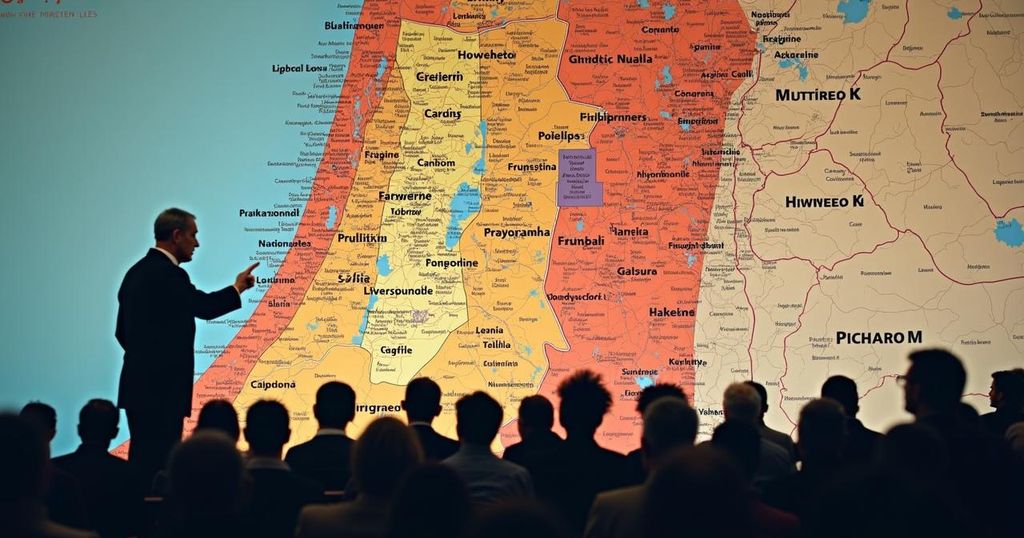Netanyahu’s UN Address: Maps Highlight Geopolitical Alliances, Omit Palestine
At the UN General Assembly, Israeli Prime Minister Benjamin Netanyahu displayed two maps illustrating the geopolitical landscape of the Middle East, categorizing countries into “The Curse” and “The Blessing,” with no reference to Palestine in either. He attributed regional instability to Iranian influence, linking it to ongoing conflicts in Lebanon and Gaza while signaling the complex state of potential relations with countries like Saudi Arabia and Egypt. The maps sparked controversy, particularly for their omission of Palestine, illuminating the challenges surrounding future peace negotiations.
During a recent address to the United Nations General Assembly in New York, Israeli Prime Minister Benjamin Netanyahu presented two maps highlighting regional geopolitical divisions. The first map depicted a Middle East characterized as “The Curse,” where countries such as Iran, Iraq, Syria, and Yemen were painted in black, while the second, termed “The Blessing,” showed countries including Egypt, Sudan, Saudi Arabia, and India in green. Notably absent from both maps was any acknowledgment of Palestine, which raises questions about its status in the ongoing discourse about Middle Eastern affairs. In his presentation, Netanyahu argued that the Iranian influence was primarily responsible for regional instability, linking it to persistent conflicts in Lebanon, Syria, and Yemen. He specifically pointed to Tehran’s support for groups like Hezbollah and Hamas as destabilizing forces. Netanyahu asserted that Israel was compelled to take military action against these groups to ensure national security and issued a stern warning to Iran, claiming, “If you strike us, we will strike you.” His speech prompted several diplomats to walk out in protest. Netanyahu’s maps also included countries like Saudi Arabia, which signals a potential realignment of alliances in the region. Despite ongoing violence between Israel and Hamas, diplomatic efforts were underway to normalize relations between Israel and Saudi Arabia, contingent upon the establishment of a Palestinian state. Egypt, which has held a peace treaty with Israel since 1979, was included in the “blessing” category, reflecting its continued role in managing regional stability, particularly with regard to Gaza. Sudan, which normalized relations with Israel under the Abraham Accords, and India’s growing partnership with Israel under Prime Minister Narendra Modi were also highlighted. The absence of Palestine on Netanyahu’s maps underscores the complexities of Middle Eastern politics and the challenges facing potential peace initiatives, particularly given the historical context of the Israeli-Palestinian conflict and the strategic interests of regional players.
Israeli Prime Minister Benjamin Netanyahu’s address at the UN presented a stark view of Middle Eastern geopolitics by using maps to illustrate the perceived dichotomy between nations aligned with Iran versus those that are Israel’s allies. The commentary surrounding these maps serves to spotlight the ongoing tensions in the region, particularly how Iranian influence is framed as a threat to stability. The maps deliberately exclude Palestine, reflecting a broader narrative in Israeli politics that complicates discussions about peace and the recognition of Palestinian claims. Nations like Saudi Arabia, Egypt, and Sudan have nuanced relationships with Israel, influenced by various geopolitical factors including security, terrorism, and regional alliances. The mention of India further indicates a shift in international relations, as India traditionally supports Palestinian sovereignty but has increasingly engaged with Israel for strategic reasons. These dynamics are crucial for understanding current and future peace negotiations in the region.
In conclusion, Prime Minister Netanyahu’s presentation at the UN illustrates the complexities and challenges of the Middle East, particularly surrounding the Israeli-Palestinian conflict. By highlighting countries in either the “Curse” or “Blessing” categories without any reference to Palestine, Netanyahu’s maps reflect an ongoing narrative that complicates peace efforts. The potential normalization of relations with Saudi Arabia, alongside the existing dynamics with Egypt and Sudan, indicates a significant geopolitical shift, with implications for both regional stability and future discussions about Palestinian statehood. The tensions arising from Iranian influence and the security concerns of Israel further complicate these developments, underscoring the need for thoughtful and inclusive diplomatic engagement.
Original Source: www.ndtv.com




Post Comment